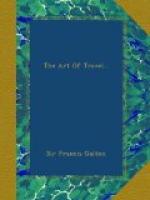Rank Meat.—I have spoken of this, in another section, p. 200.
Kabobs.—Broil the rib-bones, or skewer your iron ramrod through a dozen small lumps of meat and roast them. This is the promptest way of cooking meat; but men on hard work are not satisfied with a diet of nothing else but tough roasted flesh, they crave for succulent food, such as boiled or baked meat.
Salt Meat, to prepare hurriedly.—Warm it slightly on both sides—this makes the salt draw to the outside—then rinse it well in a pannikin of water. This process extracts a large part of the salt, and leaves the meat more fit for cooking.
Haggis.—Hearne, the North American traveller, recommends a “haggis made with blood, a good quantity of fat shred small, some of the tenderest of the flesh, together with the heart and lungs, cut or town into small skivers; all of which is put into the stomach, and roasted by being suspended before the fire with a string. Care must be taken that it does not get too much heat at first, or it will burst. It is a most delicious morsel, even without pepper, salt, or any seasoning.”
Theory of Tea-making.—I have made a number of experiments on the art of making good tea. We constantly hear that some people are good and others bad tea-makers; that it takes a long time to understand the behaviour of a new tea=pot, and so forth; and lastly, that good tea cannot be made except with boiling water. Now, this latter assertion is assuredly untrue, because, if tea be actually boiled in water, an emetic and partly poisonous drink is the certain result. I had a tin lid made to my teapot, a short tube passed through the lid, and in the tube was a cork, through a hole in which a thermometer was fitted, that enabled me to learn the temperature of the water in the teapot, at each moment. Thus provided, I continued to make my tea as usual, and to note down what I observed. In the first place after warming the teapot in the ordinary way, the fresh boiling water that was poured into it, sank invariably to under 200 degrees Fahr. It was usually 180 degrees, so great was the amount of heat abstracted by the teapot. I also found that my teapot—it was a crockery one—allowed the water within it to cool down at the rate of about 2 degrees per minute. When the pot was filled afresh, of course the temperature of its contents rose afresh, and by the addition of water two or three times repeated, I obtained a perfect mastery over the temperature of the pot, within reasonable limits. Now, after numerous days in which I made tea according to my usual method, but measuring strictly the quantity of leaves, and recording the times and the temperature, and noting the character of tea produced; then, taking as my type of excellence, tea that was full bodied, full tasted, and in no way bitter or flat, I found that this was only produced when the water in the teapot had remained between 180º and 190 degrees Fahr., and had stood eight minutes on the leaves. It




